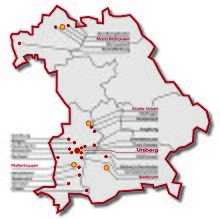Dominikus ring iron work
| Dominikus ring iron work | |
|---|---|

|
|
| legal form | Church foundation under public law |
| founding | December 1, 1884 |
| Seat | 86513 Ursberg (Swabia) |
| purpose | Disability assistance , elderly assistance |
| Chair | Walter Merkt (Chief Executive Officer) Michael Winter (Deputy Chief Executive Officer) |
| sales | 183,000,000 euros (2017) |
| Employees | 4,500 |
| Website | www.dominikus-ringeisen-werk.de |
The Dominikus -ringenisen-Werk , a church foundation under public law based in Ursberg (Swabia) , accompanies and assists people with disabilities in numerous places in Bavaria with a wide range of offers and services.
history
The Catholic priest Dominikusringenisen (1835–1904) built a facility for people with disabilities in the former Premonstratensian Abbey of Ursberg in 1884 . In 1897 he received approval to found a community of sisters, the St. Joseph Congregation Ursberg . The sisters, Franciscan Sisters, were responsible for looking after the people entrusted to them. Dominikusringenisen quickly expanded his facility not only in Ursberg. He acquired buildings and land in neighboring Krumbad , in Pfaffenhausen, Percha, Fendsbach, Maria Bildhausen and Grönenbach and made it possible for people with disabilities to live and work there. After his death in 1904, the St. Joseph Congregation continued to run the facility and expanded it. In 1927 the secularized Holzen Monastery , north of Augsburg, was acquired in 1929 as a former rural education home in Breitbrunn am Ammersee.
Between September 1940 and August 1941, as part of Operation T4 519 residents of the facility were transferred to other institutions. 199 of them were gassed in killing centers , 180 others died from starvation or lethal injections . It was not until 1984 that the institution publicly acknowledged its role in the Third Reich. From the 1970s onwards, additional services such as early intervention, day care centers, support centers, short-term care, vocational training and employee training took place. In the 1990s, new forms of living were expanded and the facilities offered and care structures were further differentiated. Due to the decreasing number of religious sisters, the St. Joseph Congregation made the institution independent on January 1, 1996 as a church foundation under public law.
Since 2005, regional and decentralized offers for people with disabilities have been created in Bavaria.
deals
The foundation supports over 5,000 people with disabilities. Around 4,200 employees work for this (as of 04/2019). The range of offers includes the areas of housing, education, work, advice as well as outpatient and open services:
- Differentiated housing offers
- Early learning, preparatory schools, special schools, school support
- Training opportunities for young people at the Ursberg vocational training center
- Jobs for people with disabilities
- Advice centers
- Open help and outpatient services
Mission statement and mission
The foundation dedicates itself to its tasks out of Christian responsibility and, according to its own statements, advocates the needs and rights of people with disabilities on the basis of the Christian image of man and according to the mandate of its founder.
The foundation thinks and acts according to its own statements from the individual needs and needs of people with support needs and disabilities. The Christian faith should be a help in life and a basis, convey faith and joie de vivre and enable a mindful interaction with one another. The employees say they encourage participation and self-determination for people in need of help and assistance. According to their own statements, they act in a professionally qualified, economical, sustainable and environmentally conscious manner. According to the company, open and respectful interaction with people who need assistance and support, with the environment and with each other is a matter of course.
literature
- Baumgartner, Isidor; Landersdorfer, Anton (ed.): Everyone is precious, Dominikusringenisen (1835–1904) a lawyer for life. Dietmar Klinger Verlag Passau 2004. ISBN 3-932949-31-5
- Immenkötter, Herbert: People from our midst - the victims of forced sterilization and euthanasia in the Dominikus -ringenisen factory in Ursberg. Ludwig Auer GmbH, Donauwörth 1992. ISBN 3-403-02287-0
- Magg, Andreas: Dominikusringenisen - way ahead of his time, development and legacy of a fascinating personality. Deni Druck und Verlags GmbH, Thannhausen 2009. ISBN 978-3-00-028071-9
- Römer, Gernot: The gray buses in Swabia, How the Third Reich dealt with the mentally ill and pregnant women. Wißner-Verlag, Augsburg 2009, 2nd unchanged new edition. ISBN 978-3-89639-694-5
- Tröger, Gert: Dominikus ringsisen and his work for the centenary of the Ursberg disabled facilities. Self-published by the St. Josef congregation Ursberg 1984. ISBN 3-932949-31-5
Web links
Individual evidence
- ↑ Data and facts. (PDF) In: dominikus-ringeisen-werk.de. Retrieved April 24, 2020 .
- ↑ Hans-Ludwig Siemen: The Bavarian sanatoriums and nursing homes during National Socialism . In: Michael von Cranach , Hans-Ludwig Siemen (ed.): Psychiatry in National Socialism. The Bavarian sanatoriums and nursing homes between 1933 and 1945 . Oldenbourg, Munich 1999, p. 439, ISBN 3-486-56371-8 .
- ^ Zeit Online: 40 Years of Silence , December 12, 1984
